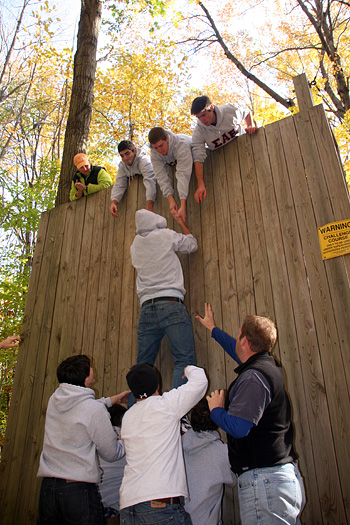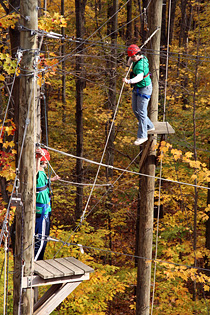Calling all alumni: Help the Greek system build community and end hazing

Fraternity members help a brother scale a wall on the Hoffman Challenge Course.
Cornell Outdoor Education (COE) is asking alumni to help Cornell's Greek community thrive.
Alumni with ties to the Greek community are being asked to encourage student leaders in Cornell's fraternities and sororities to participate in a new leadership course that will offer them the tools to educate their organization's new members in a healthy, productive way in one of several efforts under way aimed at eradicating hazing at Cornell.
"One of the challenges is getting the students to recognize in a timely fashion that this is a great opportunity," said Todd Miner, COE's Lindseth Executive Director.
Sept. 14 is the deadline for student leaders to sign up for the leadership program, Cornell Student Leadership Academy: the Fraternity and Sorority Experience.
"This program shows student leaders there are socially acceptable ways to create a rite of passage that gives new members a sense of risk and adventure, that feeling of 'We went through this challenging experience together and we're stronger for it,' but in a healthy way," Miner said.
Aimed at Greek presidents and new member educators, the program consists of five three-hour early evening sessions in October and November, and individual coaching in the spring.
Each fall session focuses on a different area of leadership skills, plus a team development exercise at the Hoffman Challenge Course, one of the largest collegiate ropes courses in the country. "They see from our facilitators how you can support somebody in a challenging situation, how you can learn to say no, how you enhance trust, how you can help students ask for help," Miner said. "Not only does it benefit them as Greek leaders but also as university students as well."

Students building trust on the Hoffman Challenge Course.
In the spring, participants meet one-on-one with a COE senior facilitator for coaching sessions to deal with such challenges as, for example, trouble with a particular individual or with communicating the seriousness with which the university is encouraging positive new member education programs. Nearly 30 student leaders from 14 Greek organizations participated in a pilot program last year, Miner said.
The program is part of the university's long-standing effort to help the Greek community create successful new member education programs and continue to be relevant, said Travis Apgar, the Robert G. Engel Associate Dean of Students and the primary liaison between the Greek community and the university administration. "The students who participated in the pilot program have articulated well the learning outcomes this experience has provided them. It's exciting to hear students share examples of how they have already applied these lessons," Apgar said.
The senior administrative leaders at Cornell believe strongly in the importance of the initiative; Susan Murphy, vice president for student and academic services, fully funded the pilot program through gifts to the division and has agreed to fund 75 percent of this year's program, Apgar added.
It's been about a year since Cornell President David Skorton challenged the university's Greek undergraduate leaders, alumni and administrators to re-examine recruiting and initiation, "end pledging as we know it," and develop an appropriate process to welcome new members that is free of degradation, humiliation or any other form of hazing. Hazing is a violation of Cornell policy and New York state law.
Cornell is home to one of the largest Greek systems in the country. Nearly one-third of its undergraduate population belongs to one of the 66 chapters recognized by the university.